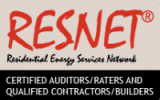Energy code compliance is a critical part of any new home construction or major renovation project in Denver. These standards are designed to save energy, reduce emissions, boost comfort, and lower utility bills. If your project doesn’t comply, you could face fines, costly delays, and may not be able to obtain a certificate of occupancy.
Denver’s energy code is complex. Without the right guidance, compliance can feel like an impossible hurdle. At e3 Power, we simplify the process, providing the clarity and support you need to stay compliant while building the home you want to live in.
Keep reading to learn what’s required and how to get it done right.
Understanding Denver’s New Energy Code for 2025
In 2025, all residential new construction and major home renovation projects in Denver need to comply with the 2021 International Energy Conservation Code (IECC), as well as Denver’s specific amendments.
The requirements can vary depending on the specifics of your project. But, in most cases, you’ll have to meet minimum standards for:
- Insulation Levels – You must meet specific R-value requirements for walls, ceilings, floors, and foundations.
- Air Leakage – The code sets limits on air leakage, with acceptable air changes per hour (ACH) varying by building type. ACH must be confirmed with a blower door test.
- Duct Leakage – Ducts must be tested for leakage and meet minimum requirements either at rough-in or post-construction.
- Mechanical Systems – Heating, cooling, and ventilation equipment must meet minimum standards for efficiency. Manual J/D/S/T calculations are generally required.
- Fenestration – Windows, doors, and skylights must meet minimum U-factors and solar heat gain coefficients.
The e3 Power team will help you understand what’s required for your project so you can plan effectively.
Compliance Pathways for Meeting Denver’s Energy Code
There’s more than one way to meet Denver’s energy code. At e3 Power, we help you identify the best compliance strategy to achieve your design goals with as little compromise as possible.
For residential construction in Denver, your options include:
- Prescriptive – Follow specific requirements for insulation, air sealing, windows, ducts, lighting, and more.
- Total Building Performance – Trade-offs between different building components are allowed, as long as overall energy performance targets are met. Ideal for design flexibility.
- Energy Rating Index (ERI) – Homes are scored by a certified HERS rater and must meet standardized requirements for energy efficiency.
How to Prepare for & Pass Your Energy Code Inspection
The easiest way to meet energy code requirements and pass your inspection is with professional energy code consulting. At e3 Power, we help you navigate this messy and confusing space so you can meet energy code with minimal hassle.
We’ll help you:
- Understand What’s Required for Your Project
We break down the code and clarify exactly what applies to your project so there are no surprises.
- Choose the Right Compliance Pathway
We review your design documents and help select the best compliance path to meet code requirements and your project goals.
- Coordinate with Your Project Team
We coordinate with your architect, designer, builder, and/or contractor to prevent miscommunication and the delays it can cause.
- Conduct Required Testing
Our team performs all necessary testing, including insulation inspections, blower door tests, duct blast tests, duct balance/TAB, and mechanical ventilation flow measurements.
- Produce & Submit Compliance Documentation
We generate all official compliance paperwork and assist you through the submittal process. If issues arise, we’ll be there to help.



